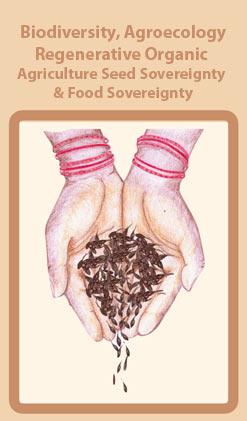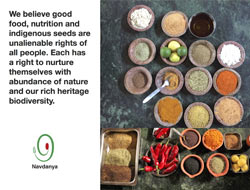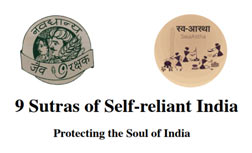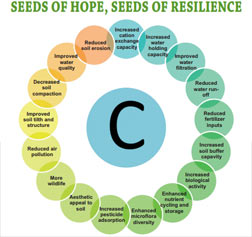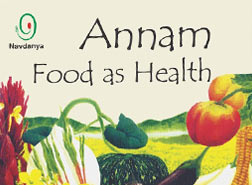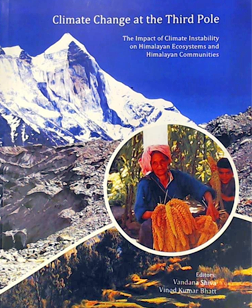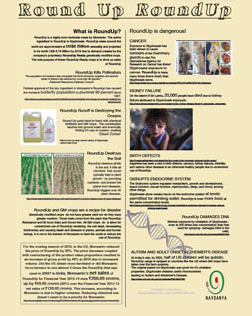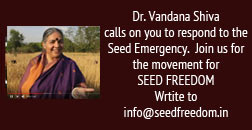In honoring the seed biotechnology industry, this year’s World Food Prize — often considered the Nobel Prize for food and agriculture — betrays the award’s own mandate to emphasize “the importance of a nutritious and sustainable food supply for all people.”[i]
The 2013 World Food Prize has gone to three chemical company executives, including Monsanto executive vice president and chief technology officer, Robert Fraley, responsible for development of genetically modified organisms (GMOs). Yet, GMO seeds have not been designed to meet the Prize’s mandate, and function in ways that actually impede progress toward the stated goals of the World Food Prize.
Twenty years after commercialization of the first GMO seeds, most are of just two types: not engineered for better nutrition but to produce a specific pesticide or to resist a proprietary herbicide. But even in reducing weeds, the technology is failing, for it has generated herbicide-resistant “super weeds” now appearing on nearly half of American farms.[ii]
MO seeds undermine sustainability in several other ways as well.
While profitable to the few companies producing them, GMO seeds reinforce a model of farming that undermines sustainability of cash-poor farmers, who make up 70 percent of the world’s hungry. GMO seeds continue their dependency on purchased seed and chemical inputs. The most dramatic impact of such dependency is in India, where 270, 00 farmers, many trapped in debt for buying seeds and chemicals, committed suicide between 1995 and 2012.[iii]
GMOs also threaten sustainability because they continue agriculture’s dependence on fossil fuels, mined minerals, and water—all resources that will only become more expensive as they become more scarce.
This award not only communicates a false connection between GMOs and solutions to hunger and agricultural degradation, but it also diverts attention from truly “nutritious and sustainable” agroecological approaches already proving effective, especially in the face of extreme weather. The Rodale Institute, for example, found in its 30-year study, that organic methods outperformed chemical farming during drought years by as much as 31 percent. Organic methods can use 45 percent less energy and produce 40 percent less greenhouse gases.[iv]
Further evidence from around the world is showing how ecological methods dramatically enhance productivity, improve nutritional content of crops, and benefit soil health, all without leaving farmers dependent on ever-more expensive inputs.[v] The UN, through its Office of the Special Rapporteur on the Right to Food, has documented ecological agriculture’s potential in hungry regions to double food production in one decade.[vi] Chaired by former World Food Prize awardee Dr. Hans Herren, the 2008 International Assessment of Agricultural Knowledge, Science and Technology for Development (IAASTD) report, developed by 400 experts and endorsed by 59 governments, calls for redirection of agricultural development toward such sustainable practices.[vii] Across the world, agroecology and food sovereignty are emerging solutions shaped and chosen by scientists and citizens worldwide.
Note that the World Food Prize mandate is also to recognize contributors to food “for all people” but GMO seeds make this goal harder to reach. The planet already produces more than enough food for all — and 40 percent more per person than in 1970. Yet, 870 million people, still suffer from extreme, long-term undernourishment because they lack power to access adequate food. Developed and controlled by a handful of companies, genetically engineered seeds further the concentration of power and the extreme inequality at the root of this crisis of food inaccessibility. An estimated 90 percent of U.S.-grown soybeans and 80 percent of corn and cotton crops.[viii]
The choice of the 2013 World Food Prize is an affront to the growing international consensus on safe, ecological farming practices that have been scientifically proven to promote nutrition and sustainability. Most regions of the world and most governments have rejected GMOs and millions of citizens have marched against Monsanto. In living democracies, discounting this knowledge and these many voices is not acceptable.
Signatories
LIST OF WORLD FUTURE COUNCIL MEMBERS SIGNING AND RIGHT LIVELIHOOD LAUREATES
Ibrahim Abouleish, RLA 2003, Egypt
Swami Agnivesh, RLA 2004, India
Uri Avnery, RLA 2001, Israel
Maude Barlow, RLA 2005, Canada
Dipal Barua, RLA 2007, Bangladesh
Nnimmo Bassey, RLA 2010, Nigeria
Andras Biro, RLA 1995, Hungary
Zafrullah Chowdhury, RLA 1992, Bangladesh
Tony Clarke, RLA 2005, Canada
Mike Cooley, RLA 1981, UK
Erik Dammann, RLA 1982, Norway
Hans-Peter Dürr, RLA 1987, Germany
Daniel Ellsberg, RLA 2006, USA
Anwar Fazal, RLA 1982, Malaysia
Irene Fernandez, RLA 2005, Malaysia
Johan Galtung, RLA 1987, Norway
Ina May Gaskin, RLA 2011, USA
Stephen Gaskin, RLA 1980, USA
Monika Hauser, RLA 2008, Germany
Martín von Hildebrand, RLA 1999, Colombia
Mohamed Idris, RLA 1988, Malaysia
Bianca Jagger, RLA 2004, Nicaragua
Erwin Kräutler, RLA 2010, Brazil
Felicia Langer, RLA 1990, Germany
Birsel Lemke, RLA 2000, Turkey
Hunter Lovins, RLA 1983, USA
Ruchama Marton, RLA 2010, Israel
Tapio Mattlar, RLA 1992, Finland
Manfred Max-Neef, RLA 1983, Chile
Raúl Montenegro, RLA 2004, Argentina
Frances Moore Lappe, RLA 1987, USA
Helena Norberg-Hodge, RLA 1986, UK
Evaristo Nugkuag, RLA 1986, Perú
Juan Pablo Orrego, RLA 1998, Chile
Nicanor Perlas, RLA 2003, Philippines
Fernando Rendón, RLA 2006, Colombia
Sima Samar, RLA 2012, Afghanistan
Vandana Shiva, RLA 1993, India
Sulak Sivaraksa, RLA 1995, Thailand
Michael Succow, RLA 1997, Germany
Suciwati, widow of Munir, RLA 2000, Indonesia
Hanumappa Sudarshan, RLA 1994, India
Alice Tepper Marlin, RLA 1990, USA
Shrikrishna Upadhyay, RLA 2010, Nepal
Janos Vargha, RLA 1985, Hungary
Alyn Ware, RLA 2009, New Zealand
Chico Whitaker, RLA 2006, Brazil
Alla Yaroshinskaya, RLA 1992, Russia
Angie Zelter, RLA 2001, UK
Additional WFC Councillors:
David Krieger
Rama Mani
Alexander Likhotal
Thais Corral
Pauline Tangiora
Anna Oposa
Scilla Elworthy
Katiana Orluc
Riane Eisler
Ashok Khosla
Hafsat Abiola, Founder and President of the Kudirat Initiative for Democracy (KIND)
Rafia Ghubash
Vithal Rajan
This is the mailing list of all Right Livelihood Award Laureates.
1 World Food Prize, About the Prize, http://www.worldfoodprize.org/en/about_the_prize/
2 Resistant Weeds – Intensifying by Kent Fraser, January 25, 2013 Status Research, http://www.stratusresearch.com/blog07.htm
3 Wesley Stephenson , “ Indian farmers and suicide: How big is the problem?” News Magazine, BBC, January 23, 2013. Notes 270,000 suicides as the “official” estimate. http://www.bbc.co.uk/news/magazine-‐21077458
4 The Farming Systems Trial: Celebrating 30 Years, Rodale Institute, 2012, http://66.147.244.123/~rodalein/wp-‐content/uploads/2012/12/FSTbookletFINAL.pdf
5 Jules Pretty, “Sustainable Intensification in African Agriculture,” Jules Pretty, Camilla Toulmin, and Stella Williams, International Journal of Agricultural Sustainability. 9(1) 2011; pp. 5–24, doi:10.3763/ijas.2010.0583 # 2011 Earthscan. www.earthscan.co.uk/journals/ijas; Soil health, see “Agro-‐ecology and the Right to Food,” Special Rapporteur on the Right to Food, http://www.srfood.org/index.php/en/component/content/article/1174-‐report-‐agroecology-‐and-‐the-‐ right-‐to-‐food; Elaine Ingham, Life in Natural Agriculture Soil, Rodale Institute, http://rodaleinstitute.org/tag/dr-‐elaine-‐ingham/
6 Ibid.
7 Agriculture at a Crossroads, United National Environmental Program, 2009.http://www.unep.org/dewa/agassessment/reports/IAASTD/EN/Agriculture%20at%20a%20Crossroads_S ynthesis%20Report%20%28English%29.pdf
8 Robert Langreth and Matthew Herper, “The Planet Versus Monsanto”, Forbes.com, 12, 31.09, http://www.forbes.com/forbes/2010/0118/americas-‐best-‐company-‐10-‐gmos-‐dupont-‐planet-‐versus-‐ monsanto.html


